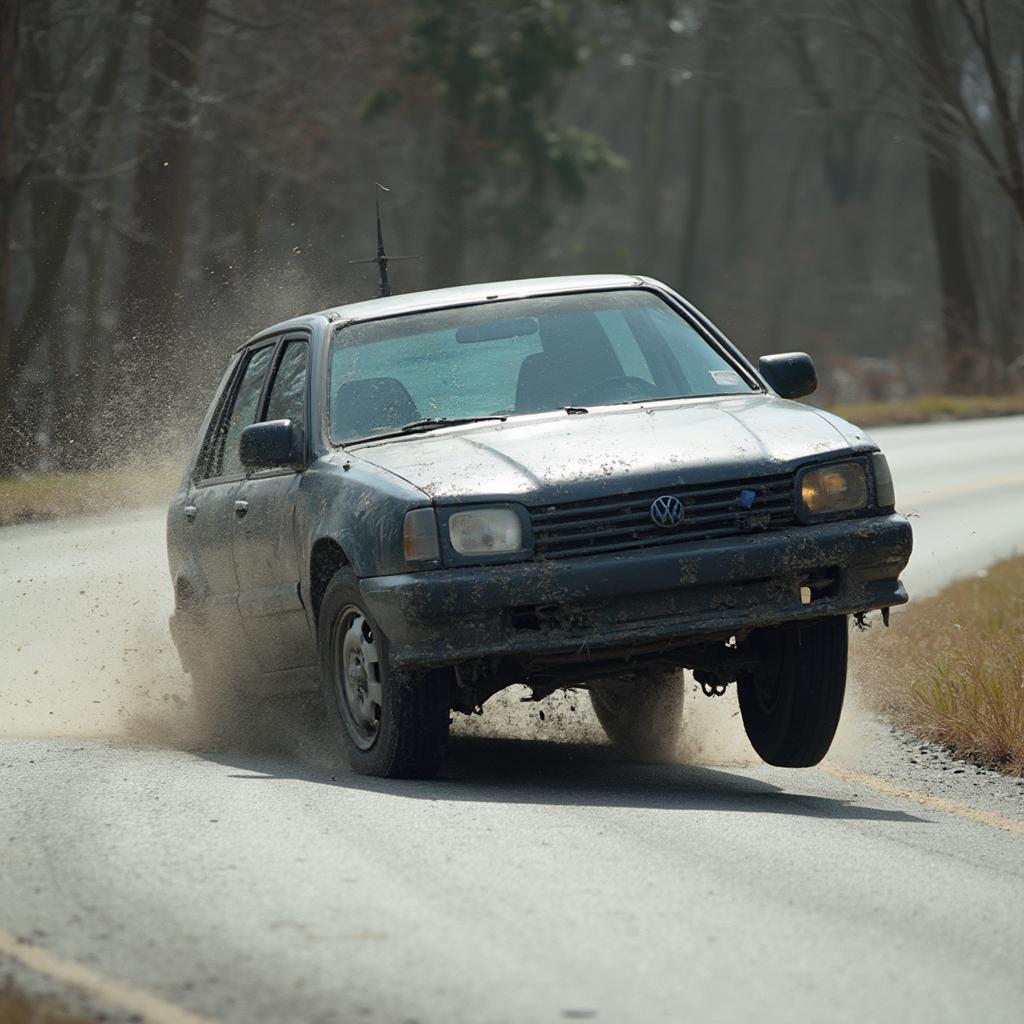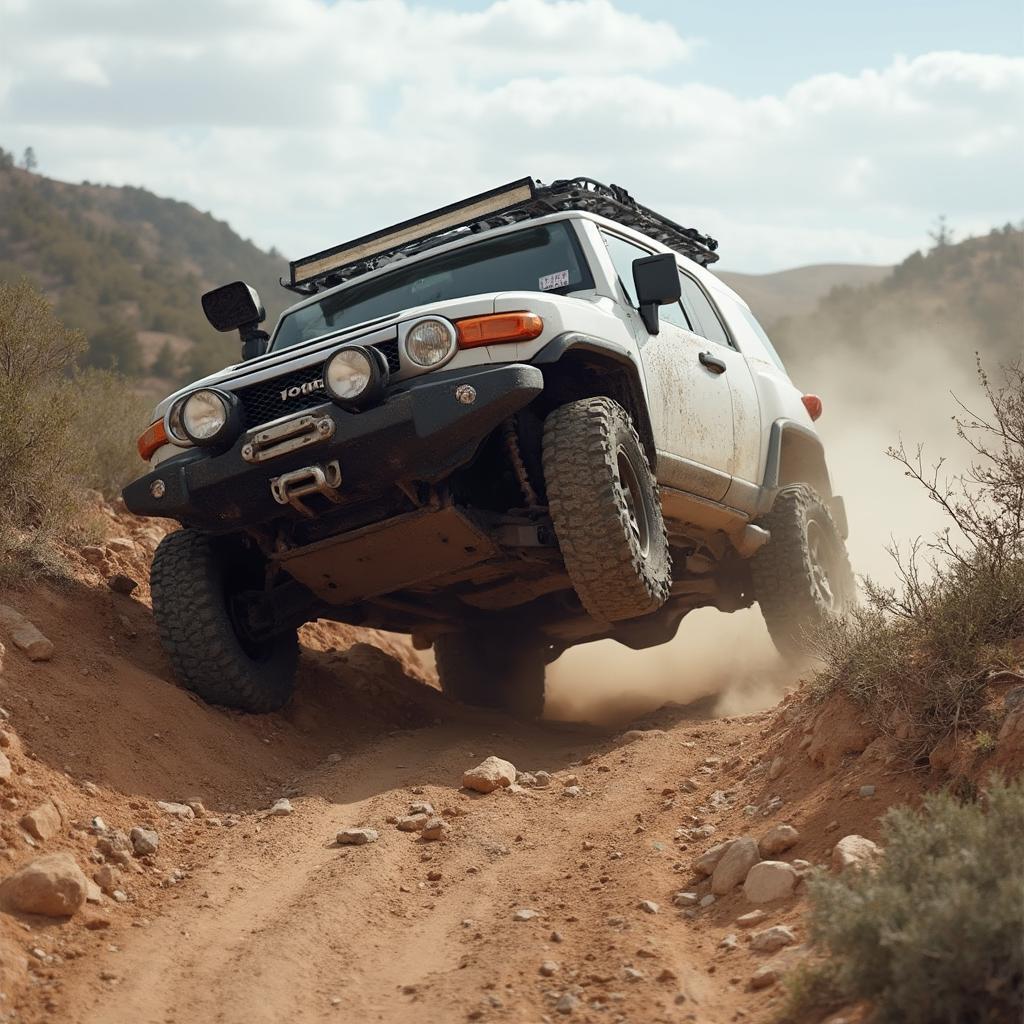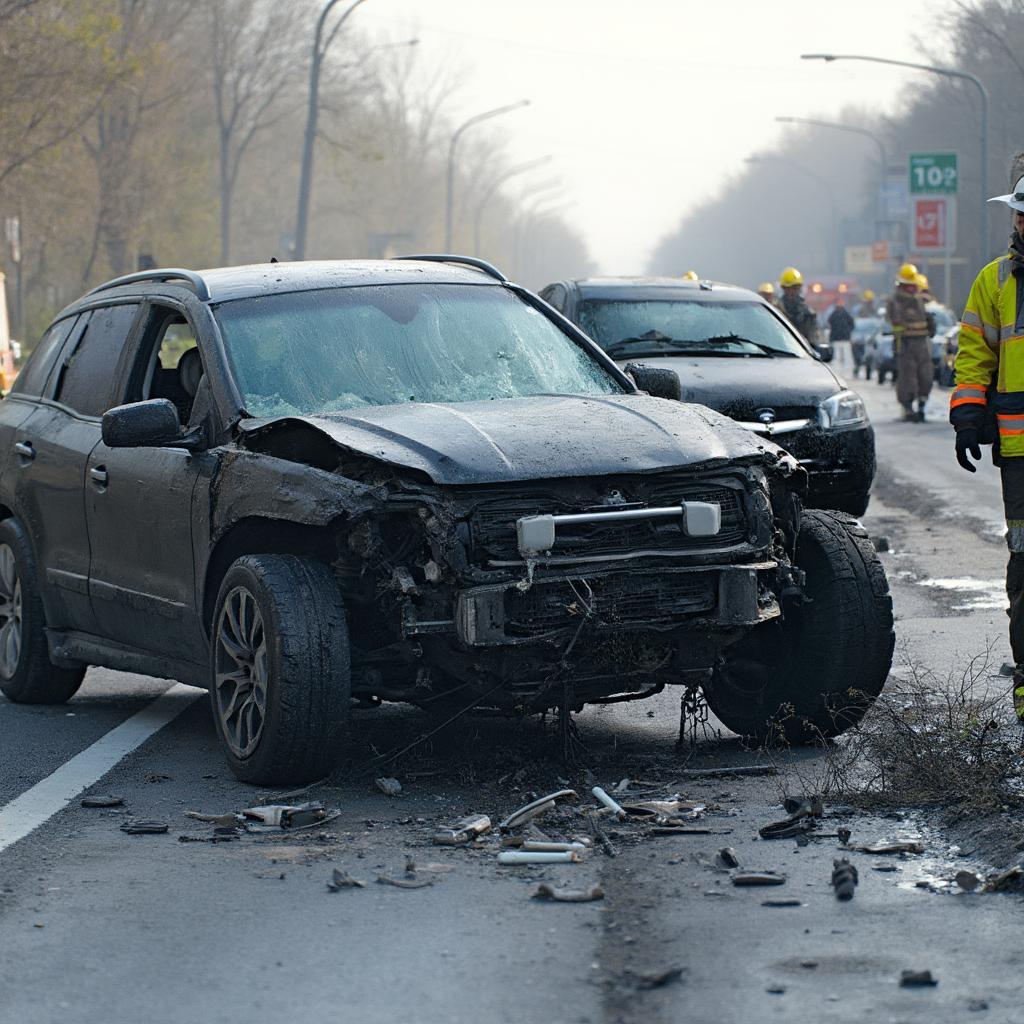Your cart is currently empty!

Tipping Over a Car: Understanding the Risks and Physics
Tipping Over A Car is a serious concern that can lead to significant damage and injuries. Understanding the factors that contribute to rollovers can help drivers make safer choices and avoid potentially dangerous situations. This article delves into the physics behind car rollovers, common causes, and preventative measures you can take.
Factors that Influence a Car Tipping Over
Several factors contribute to a vehicle’s susceptibility to tipping over. These include the vehicle’s center of gravity, its track width (the distance between the left and right wheels), the speed at which it’s traveling, and the road conditions. Higher centers of gravity, narrower track widths, higher speeds, and uneven road surfaces all increase the risk of a rollover. SUVs and trucks, due to their higher center of gravity, are generally more prone to tipping than lower-slung cars.
Center of Gravity and Stability
A vehicle’s center of gravity is the point at which its weight is evenly distributed. The higher the center of gravity, the less stable the vehicle is and the more likely it is to tip. Imagine a tall stack of blocks versus a wide, low stack. The taller stack is much easier to topple. The same principle applies to vehicles.
You can check our article on car seat tipping over for more information on the topic of stability and tipping.
The Role of Speed and Road Conditions
Speed plays a critical role in rollovers. Taking a sharp turn at high speed can shift the vehicle’s weight dramatically, increasing the likelihood of a tip. Similarly, uneven road surfaces, potholes, or sudden changes in terrain can destabilize a vehicle and trigger a rollover.
 Car Tipping Over During a Sharp Turn
Car Tipping Over During a Sharp Turn
Common Causes of Car Rollovers
While the physics of tipping over are consistent, several common scenarios contribute to car rollovers. These include:
- Sharp Turns: As mentioned, taking a turn too quickly can shift the vehicle’s center of gravity beyond its base of support, leading to a rollover.
- Overcorrection: If a driver swerves suddenly to avoid an obstacle and then overcorrects in the opposite direction, the vehicle can become unstable and tip.
- Collisions: Impact with another vehicle or object can cause a vehicle to roll, especially if the impact is at an angle.
- Tripping: This occurs when a vehicle’s tires strike an object, like a curb or uneven terrain, causing it to lose balance and potentially roll.
Avoiding Rollovers: Proactive Safety Measures
While some rollovers are unavoidable, many can be prevented by taking proactive safety measures.
- Control Your Speed: Maintaining a safe speed, especially when navigating curves or uneven terrain, is crucial.
- Avoid Sudden Maneuvers: React smoothly and deliberately to avoid overcorrection.
- Maintain Your Vehicle: Ensure your tires are properly inflated and your suspension system is in good working order.
- Load Cargo Securely: Improperly secured cargo can shift during travel, altering the vehicle’s center of gravity and increasing the risk of a rollover. For information on keeping things stable inside your vehicle, check out our article on a car seat keeps tipping over.
 SUV Tipping Over Off-Road
SUV Tipping Over Off-Road
“Driving defensively and being aware of your surroundings are key to preventing rollovers,” says automotive expert, Dr. James Reynolds, PhD in Mechanical Engineering. “Understanding your vehicle’s limitations and respecting the laws of physics can greatly reduce your risk.”
The Physics of Tipping Cars: Momentum and Inertia
Understanding the physics behind rollovers is vital. Momentum and inertia are two key concepts. Momentum is the product of an object’s mass and velocity, while inertia is the tendency of an object to resist changes in its state of motion. A vehicle with high momentum, due to high speed, has a greater tendency to continue moving in a straight line. When a force, like a sharp turn, acts on the vehicle, its inertia resists the change in direction. This resistance, combined with the momentum, can cause the vehicle to tip. You can find more information about the general topic of tipping vehicles on our page about tipping cars.
 Car Rollover After Collision
Car Rollover After Collision
“Never underestimate the power of inertia,” adds Dr. Reynolds. “It’s a fundamental force that plays a significant role in vehicle dynamics, especially in scenarios like sharp turns or sudden braking.” He emphasizes that drivers should anticipate potential hazards and adjust their driving accordingly.
Conclusion
Tipping over a car is a dangerous event with potentially devastating consequences. Understanding the factors that contribute to rollovers, including a vehicle’s center of gravity, speed, and road conditions, is crucial for safe driving. By practicing defensive driving techniques, maintaining your vehicle, and being aware of your surroundings, you can significantly reduce your risk of experiencing a rollover. Remember that safe driving practices are the best defense against the physics of tipping over a car.
FAQs
- Are SUVs more prone to tipping than cars? Yes, generally SUVs have a higher center of gravity, making them more susceptible to rollovers.
- What should I do if my car starts to tip? Try to steer in the direction of the skid and avoid slamming on the brakes.
- How can I improve my car’s stability? Ensure proper tire inflation and maintain your suspension system.
- What is the most common cause of rollovers? Sharp turns at high speeds are a leading cause.
- How can I secure cargo to prevent rollovers? Distribute weight evenly and use appropriate tie-downs.
- Do electronic stability control systems help prevent rollovers? Yes, these systems can help mitigate the risk by automatically applying brakes and adjusting engine power.
- Is it safe to drive a lifted truck? Lifting a truck raises its center of gravity, making it more prone to tipping. Drive with extra caution.
If you are concerned about a three wheel car tipping over, you can find more information on our website. Or, if you’ve seen a bear tipping over car, that’s certainly a unique situation and we may have an article on unusual Car Tipping incidents!
For further assistance, feel free to contact us via WhatsApp: +1(641)206-8880, Email: [email protected] or visit our office at 456 Pine Avenue, Toronto, ON M5V 2J4, Canada. We have a 24/7 customer support team ready to assist you.

Leave a Reply